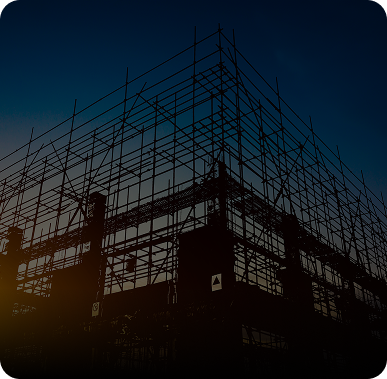Generic AI Doesn't Win Government Contracts
The AI platform that helps leading government contractors find the right opportunities, write winning proposals, and deliver on what they promised.
The Problem with Government Contracting AI Today
Most teams are stuck choosing between tools that don't actually help them win.
Generic AI = Generic Proposals
ChatGPT doesn't know FAR, CPARS, or evaluation criteria. You get boilerplate that looks like everyone else's.
Legacy Tools = Slow & Clunky
Months of setup, rigid workflows, and systems that fight you instead of helping you move faster.
Point Solutions = Fragmented
One tool for search, another for proposals, another for compliance. Nothing connects.
Speed Without Strategy = Wasted Effort
Tools that prioritize volume over wins make you faster, not better. Your proposals fail to differentiate. Your win rate stays flat.
One Platform. The Entire GovCon Lifecycle.
One AI-native platform to find the right opportunities, win more contracts, and deliver with confidence.
Your Partner Across the Entire GovCon Lifecycle
More than software. A true partner from opportunity to delivery.
Find and Qualify the Right Opportunities Faster
Surface best-fit government opportunities across federal, state, and local. Make confident bid/no-bid decisions in minutes, not days.
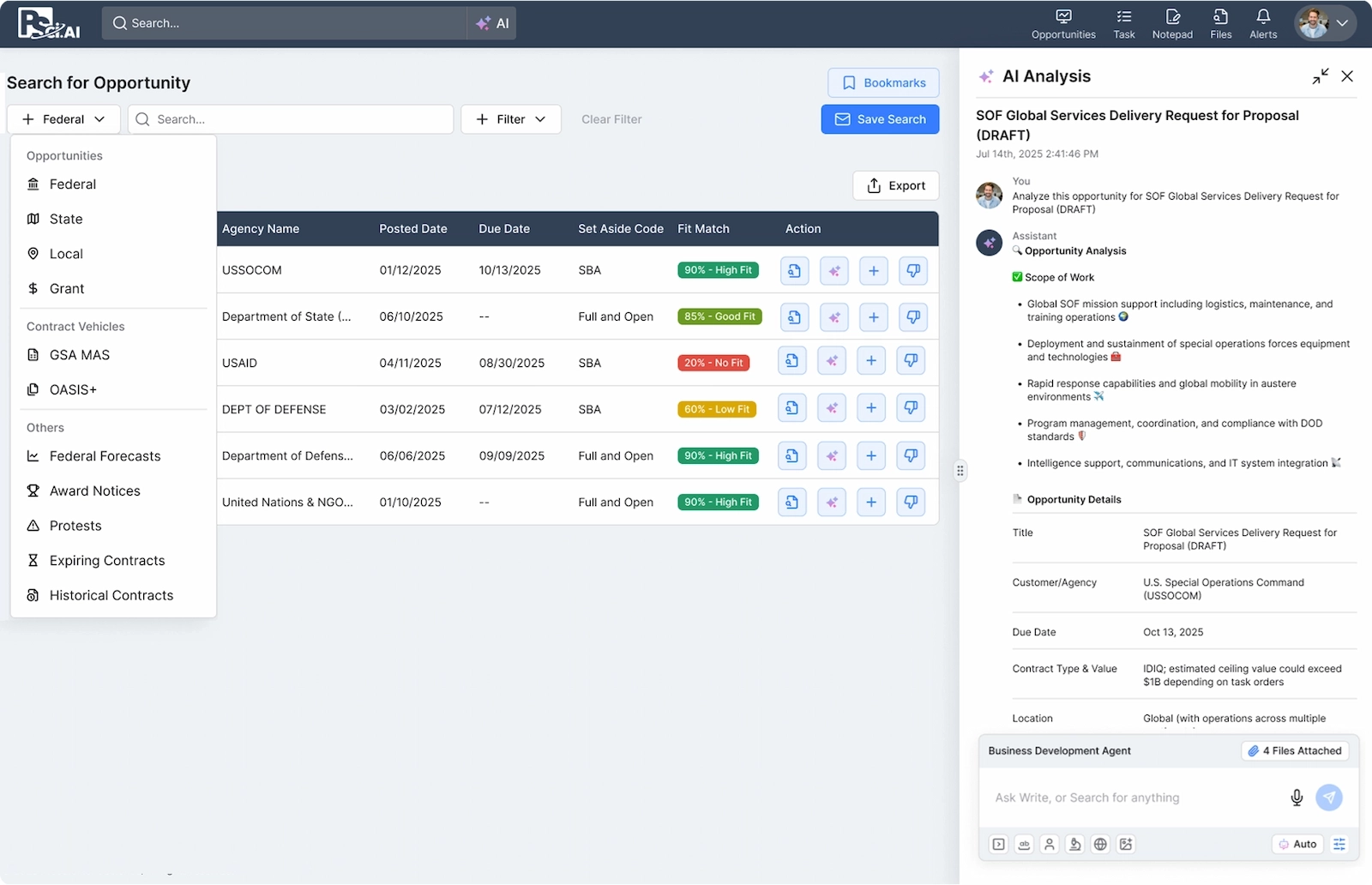
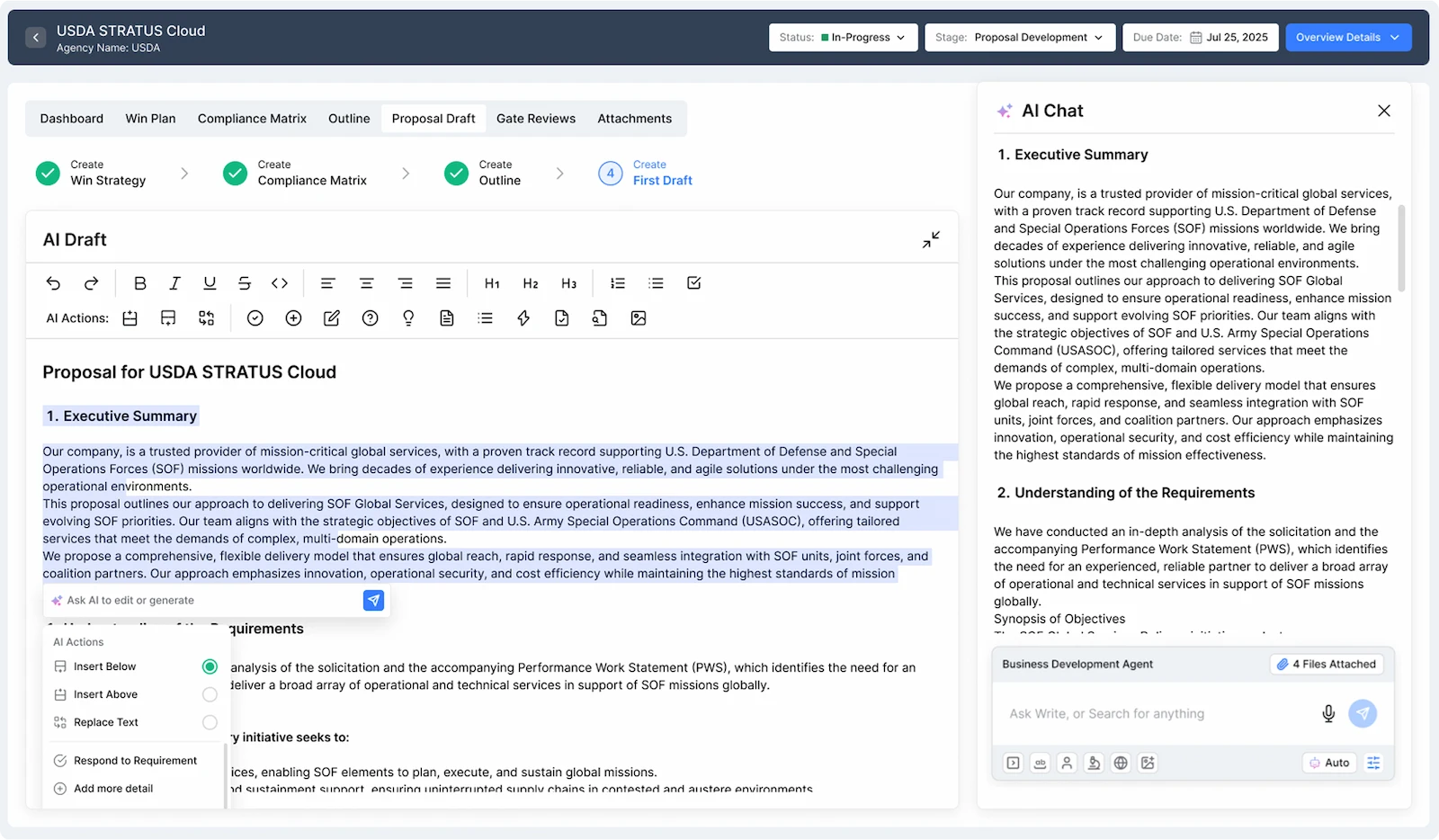
Build Winning Proposals, Not Boilerplate
Generate compliant, differentiated proposals that win. Draft faster, automate compliance, and execute structured color reviews within one integrated AI platform.
Protect Margins. Deliver on Promises.
Seamless handoff from proposal to execution. Keep delivery teams aligned with what you committed to win.
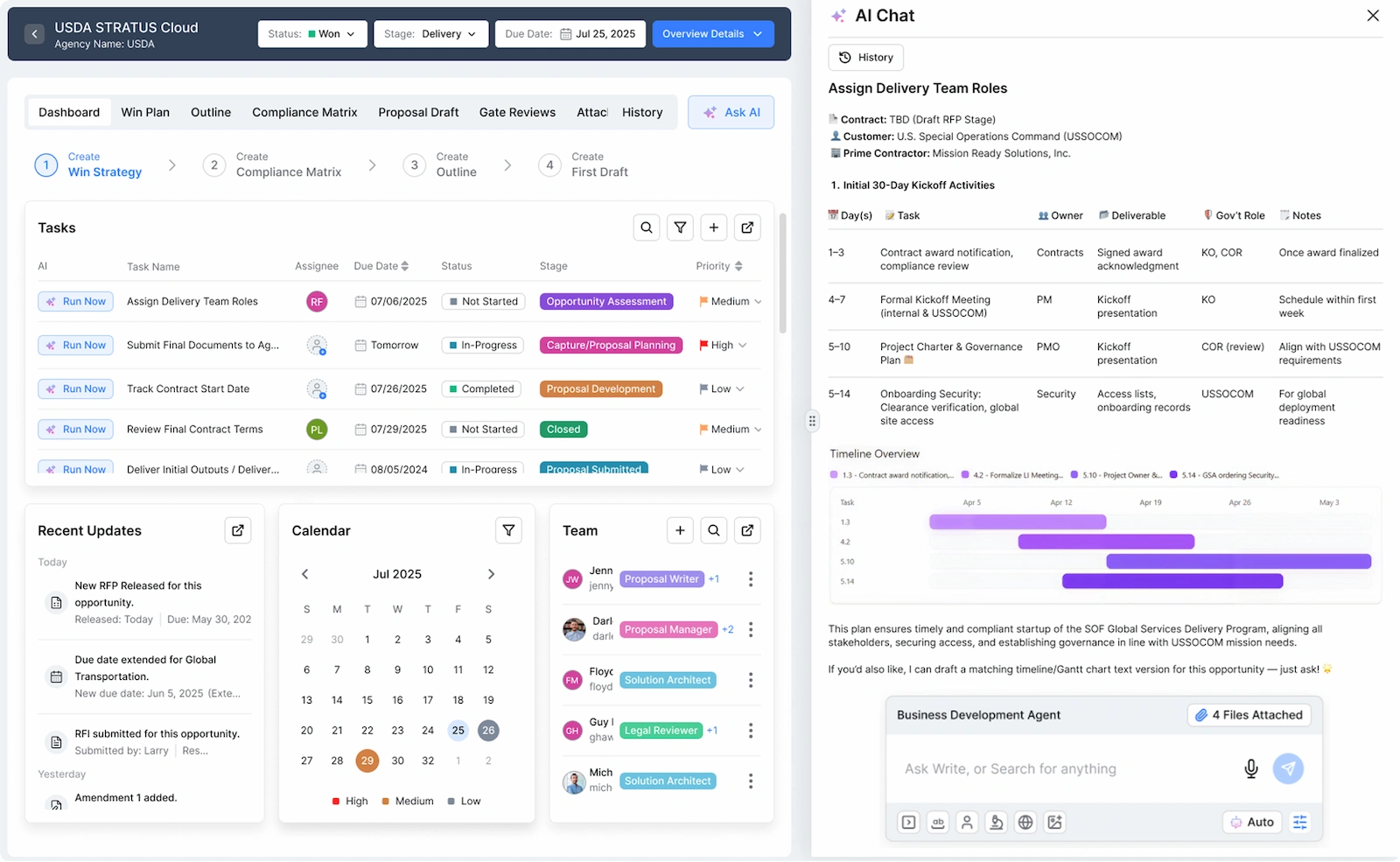
The AI Platform Powering the Nation’s Top Government Contractors
Trusted by leading and fast growing government contractors to power proposal, business development, and capture teams. We embed AI across the full lifecycle to help organizations win more, increase competitiveness, and operate smarter.
Built for scale. Built for security. Built to win.
In AI-Assisted Awards
Top Government Contractors
Of the Top 100
Years Gov Contracting Experience

Backed by Institutional Investors
Data Points Indexed
Of Winning Proposals
Founded
Recognized as Leaders Transforming How Government Contractors Win

CEO Recognized as APMP 40 Under 40

DCA Live Red Hot Companies Award

Top AI Trailblazer for GovCon

Top AI Platform for Government Contractors

CEO Recognized as AFCEA 40 Under 40

Bain Capital Ventures Top 50 Vertical AI SaaS
More Than Software. A Strategic Partner in How You Win.
Built by military and government contracting veterans, Procurement Sciences was created to eliminate the bottlenecks that limit win rates and slow growth.
Today, we power hundreds of leading contractors and have supported billions in AI assisted awards. We embed AI across proposal, capture, and business development and equip your people with the training and certification needed to operate at a higher level. The result is a measurable and lasting competitive advantage.
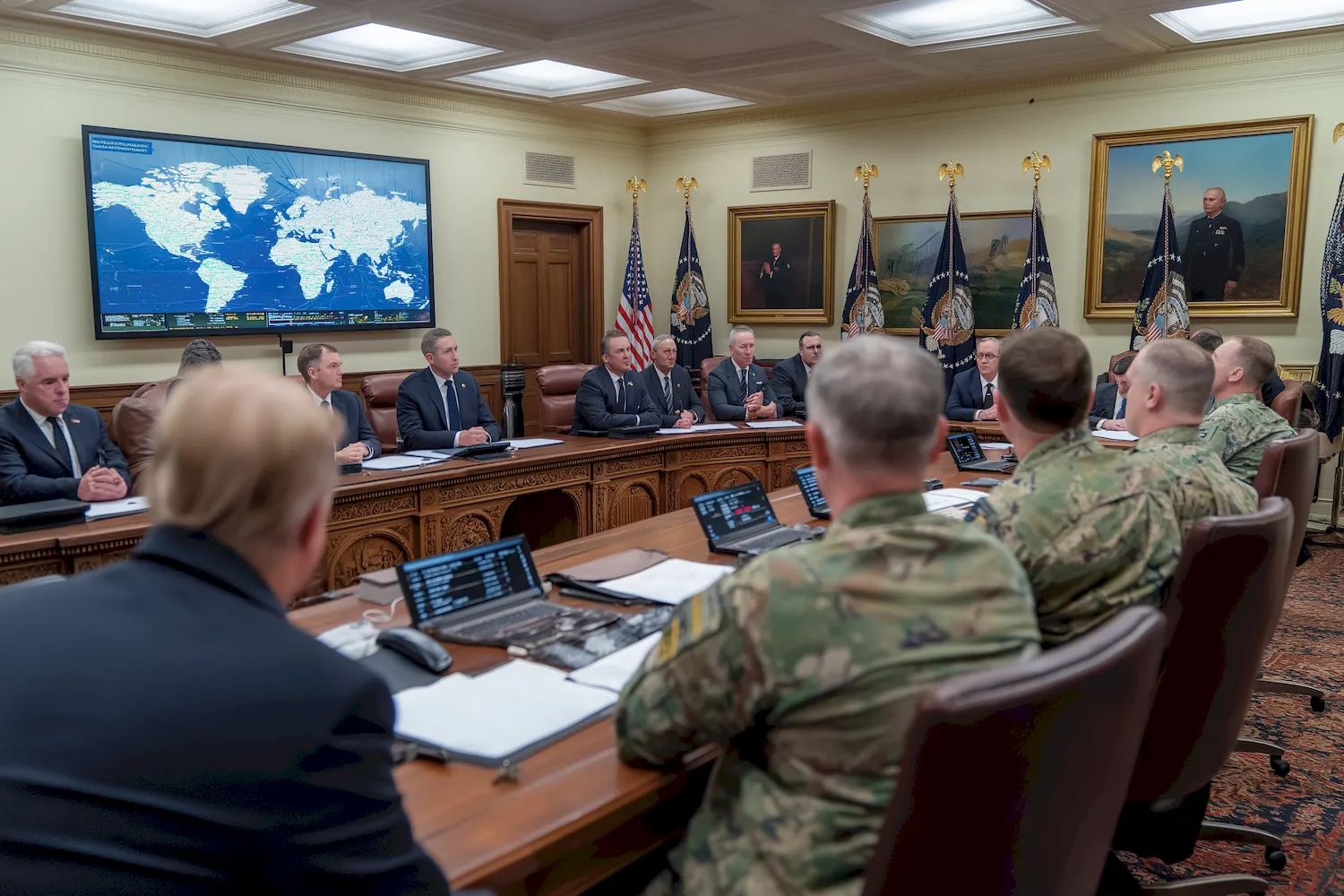
Built by Government Contracting Veterans
Founded by a U.S. military veteran and government contracting executive. Backed by 500+ years of combined experience from leaders across the GovCon ecosystem, including primes, integrators, and GovCon technology providers.

AI That Adapts to You
Our AI adapts to your workflows, color teams, and SOPs. Not the other way around. Zero forced process changes. Immediate value.

Real Experts, Embedded Support
Embedded AI Strategists work hands-on with your team. Twice-daily webinars. Certifications. Support that actually knows government contracting.
Hear It From Our Customers
Enterprise Security.
Government-Ready.
Purpose built architecture designed for the most sensitive government workloads.
Your data remains fully isolated within your environment. It is never blended, commingled, or used to train public AI models.
Our proprietary AI architecture grounds outputs in your company’s documents and knowledge base while maintaining strict tenant isolation and security controls.
Built to Win More, Increase Capacity, and Drive Smarter Growth
Align leadership and operators around one AI-powered growth engine that strengthens competitiveness across your entire organization.
Simple Pricing. Serious ROI.
What's It Really Costing You Right Now?
$10M in lost revenue. $300K-$500K in wasted B&P spend. And your competitor just got stronger.
Limited proposal capacity means saying "no" to opportunities you could win. That's revenue left on the table.
On a $50M pipeline, that's $2.5M in lost revenue, and a scramble to backfill the gap.
Your competitors are using AI to respond faster, write better, and win more. Every month you wait, they pull further ahead.
it's what not having it is costing you.
ROI Calculator
Every company realizes savings differently. To obtain a more accurate evaluation of your company’s potential ROI, consider having one of our experienced professionals perform an assessment.
Calculate Your Cost Savings
Ready for a True Government Contracting AI Partner?
Talk to a platform expert who knows government contracting, not a sales rep. See the platform in action and receive a custom ROI assessment tailored to your business.
- Human-in-the-loop AI you can trust
- Built by government contracting veterans
- Embedded strategists, not support tickets
- A partner invested in your wins
